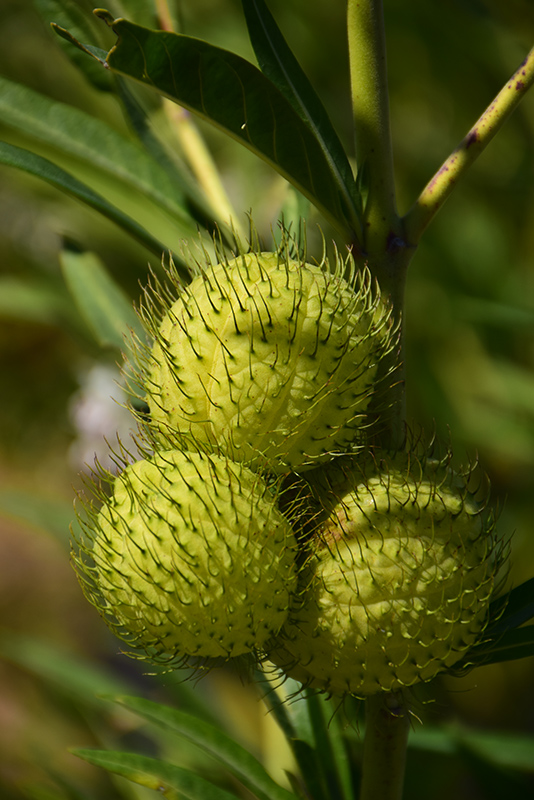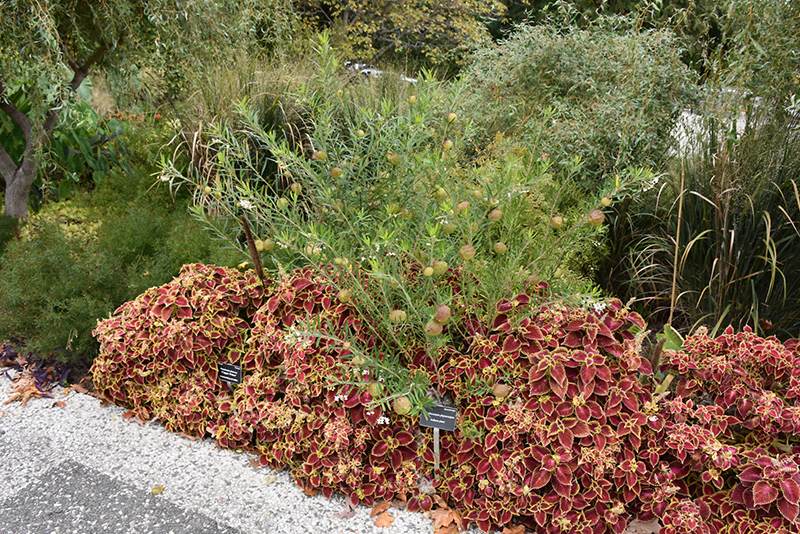Height: 6 feet
Spread: 3 feet
Sunlight:
![]()
Hardiness Zone: (annual)
Other Names: Balloon Cotton Bush, Giant Swan Plant. Hairy Balls
Description:
A large, upright perennial that is noted for its interesting, pale green, balloon-like seed pods on slender stems; clusters of pendulous small white flowers with a light vanilla scent, appear in summer; a pretty, unusual addition to sunny beds and borders
Ornamental Features
Balloon Plant is primarily grown for its highly ornamental fruit. The fruits are showy light green pods with chartreuse overtones and which fade to burgundy over time, which are carried in abundance from mid summer to mid fall. It features dainty clusters of lightly-scented white flowers along the stems in early summer. The flowers are excellent for cutting. Its small narrow leaves remain lime green in color throughout the season.
Landscape Attributes
Balloon Plant is a dense herbaceous annual with an upright spreading habit of growth. Its medium texture blends into the garden, but can always be balanced by a couple of finer or coarser plants for an effective composition.
This plant will require occasional maintenance and upkeep, and should be cut back in late fall in preparation for winter. It is a good choice for attracting bees and butterflies to your yard, but is not particularly attractive to deer who tend to leave it alone in favor of tastier treats. Gardeners should be aware of the following characteristic(s) that may warrant special consideration;
- Self-Seeding
Balloon Plant is recommended for the following landscape applications;
- Mass Planting
- General Garden Use
- Naturalizing And Woodland Gardens
- Container Planting
Planting & Growing
Balloon Plant will grow to be about 6 feet tall at maturity, with a spread of 3 feet. Although it's not a true annual, this slow-growing plant can be expected to behave as an annual in our climate if left outdoors over the winter, usually needing replacement the following year. As such, gardeners should take into consideration that it will perform differently than it would in its native habitat. This is a self-pollinating variety, so it doesn't require a second plant nearby to set fruit.
This plant should only be grown in full sunlight. It prefers dry to average moisture levels with very well-drained soil, and will often die in standing water. It is considered to be drought-tolerant, and thus makes an ideal choice for a low-water garden or xeriscape application. This plant should not require much in the way of fertilizing once established, although it may appreciate a shot of general-purpose fertilizer from time to time early in the growing season. It is not particular as to soil type or pH. It is highly tolerant of urban pollution and will even thrive in inner city environments. This species is not originally from North America, and parts of it are known to be toxic to humans and animals, so care should be exercised in planting it around children and pets..
Balloon Plant is a fine choice for the garden, but it is also a good selection for planting in outdoor pots and containers. With its upright habit of growth, it is best suited for use as a 'thriller' in the 'spiller-thriller-filler' container combination; plant it near the center of the pot, surrounded by smaller plants and those that spill over the edges. It is even sizeable enough that it can be grown alone in a suitable container. Note that when growing plants in outdoor containers and baskets, they may require more frequent waterings than they would in the yard or garden.



